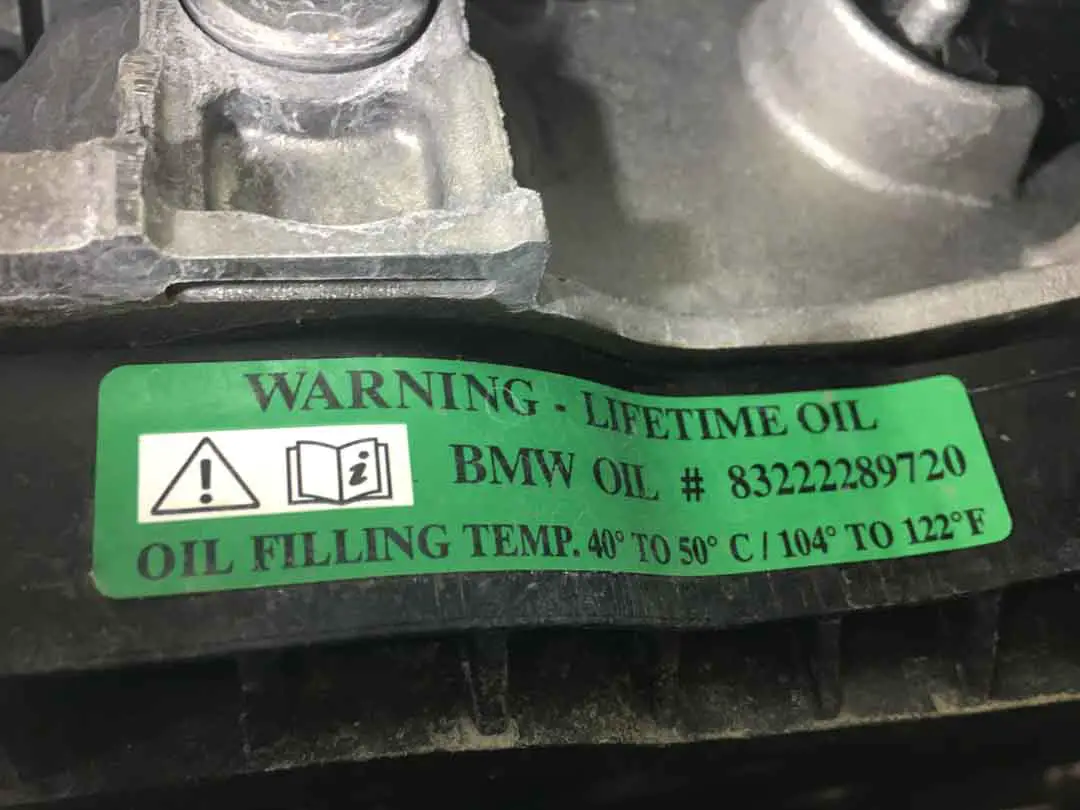The Transmission Tangle: Deciphering the 'Lifetime' Oil Debate in BMWs

Ah, the age-old conundrum: to change or not to change?
That, my friends, is the slippery question.
Picture this: on one side, we've got the Bavarian behemoth, BMW, confidently strutting its stuff and declaring, "Hey! Our transmission oil? It's good for life. No change needed!"
Sounds a bit like that guy at the party who claims he's the best dancer, doesn't it?
Now, enter stage right, ZF – the actual maestro behind those German gears, doing a little side-eye and whispering, "Well, maybe around 50,000 to 90,000 miles wouldn't hurt."
It's like your dance instructor subtly pointing out that maybe, just maybe, you're not quite as light on your feet as you think.
So, who do we trust in this mechanical melodrama?
Do we side with the suave Bavarians who built the car or the meticulous maestros who crafted the transmission? It's a bit like choosing between Sinatra's vocals and Quincy Jones' orchestration—both masters in their domain, but perhaps with a slightly different tune.
Buckle up, gearheads.
We're about to dive deep into this oily opera, and I promise you, it's going to be a smooth ride (well, depending on your transmission oil choices).
Historical Context: A Trip Down Memory's Gear Lane
Picture it: 1996.

The Spice Girls were telling us what they really, really wanted, and flip phones were all the rage.
But in the automotive world, BMW was dropping a bombshell.
They rolled out with these snazzy new maintenance-free automatic transmissions, saying, "Why worry about changing oil? We've got you covered for life!" It was like watching someone confidently strut in bell-bottoms again, but this time in the world of cars.
Now, these weren't just any transmissions.
We're talking about gearboxes lovingly crafted by the likes of ZF, General Motors, and Jatco (though, for our friends in Japan only).
For BMW mechanics of the day, this was akin to being handed a golden ticket. There was a certain magic in the air, a sense of trust. It's like if your grandma handed you her secret cookie recipe - you just believed it was the best.
However, not everyone was sipping the BMW Kool-Aid. The transmission rebuilders – those wizards who dive deep into the world of gears, clutches, and synchros – raised an eyebrow.
They whispered amongst themselves, each with their own tales and testimonies, proclaiming the need to change transmission oil regularly. And you know what? The big names, like GM and ZF, nodded in agreement, albeit suggesting slightly longer intervals.
Imagine a symphony with two distinct sections: one playing a carefree tune of "Never Change," and the other, a more cautionary melody of "Change... But Not Too Often."
This was the soundtrack of the automotive world as the 20th century neared its close. And oh, what a dance it was.
The Ongoing Debate: 26 Years and Counting
Fast-forward to today, and it's like we've stepped into a time warp. BMW, ever the stalwart, hasn't budged an inch. They're still singing from the same hymn sheet, insisting their transmission oil is like the fountain of youth—never aging, never needing a change.

It's as if they've discovered the automotive equivalent of botox, promising eternal youth for your car's guts.
On the other hand, our transmission titans—ZF, GM, and Aisin—have fine-tuned their chorus. They harmonize on a range that spans from 20,000 to a whopping 90,000 miles, adding layers of nuance to the debate. It's a bit like asking how often you should get a haircut; it depends on who you ask and how you style it.
Are you going for the rugged Jon Snow look, or are you more of a freshly-coiffed Bond?
The beauty of this 26-year-old debate is that there's truth on both sides.
It's not a black-and-white movie; it's a full-color feature film with plot twists and turns. BMW's claim isn't without merit. After all, if their machines can cruise down the Autobahn without a hiccup, there's got to be some secret sauce in there, right?
But the transmission manufacturers bring to the table decades of experience and a deep understanding of the intricate ballet of gears and oils. They're not just making wild guesses; they're basing their recommendations on hard data and real-world wear and tear.
In essence, it's a game of trust.
Who do you believe?
The automaker that promises eternal bliss or the experts who craft the intricate dance of gears?
Let's dive deeper, rev up our engines, and see if we can find some middle ground in this automotive tango.
Arguments For Regular Oil Changes: The Good, The Gritty, and The Gunky
Alright, gearheads, let's get down to the nitty-gritty.
Imagine this: You're at a fancy gala, and the hors d'oeuvres are making the rounds. You grab a mini sandwich, and it's delightful—once, twice, a dozen times. But by the 100th time? It’s lost its charm, and you're yearning for something fresh.
Well, that's your transmission oil talking.
The Transmission's Plea
Here's the thing—transmission oil isn't just there to look pretty. It's got a job to do. It battles oxidation, fends off friction modifiers losing their mojo, grapples with pesky water condensation, and constantly sweeps out abrasive intruders. It's the unsung hero in the grand opera of your car's mechanics.
But guess what?
Every superhero has their Kryptonite. Over time, that oil starts to feel the pressure. Additives start to wear out, contaminants start party-crashing, and before you know it, that once pristine liquid turns into a sludgy mess.
Kind of like that mini sandwich after being out for hours.
BMW’s Counter
But wait, says BMW, wielding almost three decades of "I-told-you-so." Their transmissions have been cruising around the globe, and the oil?
It's holding its ground. It doesn't break down easily, water rarely throws a party in the transmission housing, and even if some contaminants sneak in, they don't mess with the shift quality.
It's like having a sandwich that never goes stale. Magic? Maybe.
The Middle Ground
Both sides have their merits. Changing transmission oil regularly is like giving your car a spa day. It's refreshed, rejuvenated, and ready to hit the road with renewed zest. On the flip side, BMW's track record shows that their vehicles, even those with untouched transmission oil, can age like fine wine.
However, here's a curveball for you: some transmissions that have never seen an oil change can sometimes outlast their pampered counterparts. Mind-boggled? So were we.
But the reasons?
Oh, they're intriguing.
Let's shift gears and dive into the mechanics of it all.
Analyzing Transmission Longevity: The Dance of Heat and Harmony
Now, let's step into the world of transmissions, where heat is the nemesis and harmony is the ultimate goal. If transmissions had a top enemy, one they'd arch their metaphorical eyebrows at, it would be overheating.

It’s like that one person at a party who just won't stop talking—eventually, things get too heated.
The Deadly Spiral
When transmission oil hits its flash point (imagine a fiery tango at around 400°F/206°C), it starts to throw a fit. It burns, loses its slick moves, and generates even more heat. It's a vicious dance, one that you don't want to get caught up in. Because when that oil's burned out?
It's not just tired; it’s taken the clutch packs down with it.
The Culprits of Overheating
So, what gets this oil all hot and bothered in the first place?
Let’s break it down:
- Lack of Transmission Oil: Picture a marathon with not enough hydration stations. It's not going to end well. Similarly, when there's less oil circulating, the remaining oil gets stressed and heats up quickly. This can happen due to excessive idling on hot days, intense speed drives, frequent racing, or even dragging a hefty load uphill.
- Volume Matters: Think a 5 or 10% volume loss isn't a big deal? It's like saying being 5 or 10 minutes late to a rocket launch isn't significant. According to the Arrhenius equation, for every 18°F increase in oil temperature, the oil's life gets halved. So, a little loss can lead to a lot of problems down the road.
Leaks vs. Shortages: Here's a plot twist. If you've got a leak, even a big one (think leaking oil cooler line’s o-rings), once repaired and refilled, that transmission might just waltz around for years as if it had never missed a beat.
But if there's no leak and the oil is short?
That’s a tragedy waiting to unfold. It's like having a tiny pebble in your shoe; it might seem insignificant, but over time, it can be more damaging than a large, obvious obstacle.
Detective Work: Leaks can be sneaky, but they're usually spotted during routine check-ups. Massive leaks? They're drama queens, causing immediate symptoms and forcing quick action.
But a shortage without a leak is the silent assassin.
It's hard to detect, especially since BMW's maintenance schedule doesn't have a "check transmission oil level" reminder. It's these 'small losses'—like high blood pressure—that might not show symptoms but can be deadly.
In Conclusion: If you're looking for the chief culprit behind BMW transmission issues, it's not some grand conspiracy or alien interference—it's plain and simple incorrect oil refill procedures.
But hold onto your gear knobs; we've still got more layers of this story to peel back.
Common Transmission Faults: The Missteps in our Mechanical Dance
In the symphony of car mechanics, each part plays its role. But sometimes, there's a sour note, a missed beat, and it throws the whole performance off.
Let's take a look at some of these pesky pitfalls that can lead to transmission woes.
1. The Wrong Groove: Misplaced Transmission Oil
Modern automatic transmission oils aren't just generic, one-size-fits-all solutions. They're carefully choreographed to work in harmony with specific transmissions.
Think of Chrysler in the early 1990s introducing their ATF+3, a fluid that danced perfectly with their friction disc (clutch) material.
Use the wrong partner, like Dexron or Mercon, and you're not just off-beat—you're setting the stage for a meltdown.
2. The Slippery Slope of Substitutes
Despite knowing the dangers, the wrong oil still finds its way into transmissions. Why? Because the market can be a maze.
Mislabelled products, misleading bottles, and downright fraudulent transmission oils masquerade as the real deal. And it's not always malicious.
Sometimes, it's just a matter of cross-contamination, with shops using the same pump for different oil types. It's like pouring apple juice and orange juice from the same jug—neither drink tastes right afterward.
3. The OE Anthem
Here's a pro tip: stick to OE (Original Equipment) BMW and ZF Lifeguard transmission oils.
Consider them the lead vocalists, perfectly in tune with your vehicle. And don’t skimp on the details—ensure you're refilling with a dedicated or clean pump.
4. Shift Management: The Overlooked Maestro
Ignoring the early signs of transmission issues is like letting a small fire smolder—it'll eventually blaze out of control. A quirk here or there? Manageable.
But persistent problems like shudders, harsh shifts, and RPM fluctuations are red flags. And by the time that 'Transmission Malfunction' warning blares, you're already in the final act of a tragedy.
The Mechanics of a Smooth Shift
For a seamless transition, pressure overlap between the oncoming and off-going clutch needs to be spot-on.
But when components like mechatronics’ pressure regulators falter, or there are cracks in the separator (gasket), this harmony is disrupted.
The result?
Overheating and a downward spiral for your clutch packs and oil.
In a Nutshell
The world of transmissions is intricate, with each component playing its part in the grand ballet of mechanics. But when one dancer is off, the entire performance suffers.
Whether it's the wrong oil, a subtle leak, or a malfunctioning shift system, it's essential to recognize the signs, fine-tune the issues, and get your car back on the road, dancing smoothly to its mechanical rhythm.
The Real Life of Transmission Oil: Myths, Magic, and Mileage
Step into the magical realm of transmission oil, where tales of eternal youth rival those of Ponce de León's Fountain of Youth.
Let's take a journey through time, technology, and tenacity to uncover the truths and tales of transmission oil longevity.
The Eternal Question: Can It Truly Last Forever?
It's a claim that seems straight out of a fairy tale: transmission oil that never ages. But guess what? I've seen these legends come to life. Cars clocking 300,000 or even 400,000 miles on their original transmission oil.
These are not mere urban legends; they are stories written on the odometers of countless vehicles.
The Evolutionary Tale of Transmission Oil
Travel back to the 1950s and 1960s, a golden era where cars with untouched transmission oils cruised into junkyards with nary a hiccup. Mechanics back then were content with the 100,000-mile oil change interval.

But as with all tales, there was a twist in the story.
Ford, in 1967, dreamt bigger, envisioning a “lifetime” oil that would defy time itself. And thus began the saga of ‘lifetime’ oils.

But then, the plot thickened. The 1970s brought challenges: the prohibition on whale hunting and the Clean Air Act. The once-reliable ingredient, sperm whale oil, vanished from the mix, sending transmissions into chaos.

It was like taking the magic out of the potion.
The result?
A surge in transmission breakdowns.

The hero of our story emerged in the late 1980s: jojoba oil. But, as with all epic tales, this solution was fleeting.
The true savior?
A synthetic Liquid Wax Ester (LXE) developed by International Lubricants. Despite initial skepticism, this innovation transformed the landscape, possibly paving the way for BMW's maintenance-free vision in 1996.
Oxidation: The Arch-Nemesis
Every story has its villain, and in the world of transmission oils, it's oxidation. This foe deteriorates the oil's frictional properties, leading to poor performance and, eventually, clutch failure.
But what's feeding this adversary?
Heat and air.
As temperatures fluctuate, the transmission releases and inhales fresh air, providing oxidation to the very elements it thrives on.
Enter the hero: the Transmission Air Breathing Suppressor valve (TABS).
This ingenious device manages the transmission's breathing, ensuring that only minimal air enters, thus keeping oxidation at bay.
The Heat Conundrum
Air might be under control, but what about heat? With advancements in transmission design and oil evolution, the need for frequent oil changes has diminished.
The real challenge?
Detecting overheating, which can be as subtle as a villain lurking in the shadows. Solutions range from a simple sniff test (does it smell burned?) to laboratory analysis.
In Retrospect
The life of transmission oil is an epic filled with heroes, villains, challenges, and innovations. While the promise of 'forever' might be alluring, it's essential to listen to your car, understand the tales of yore, and make informed decisions.
The quest for eternal youth might be a myth, but with the right care, your transmission oil can indeed have a long and legendary life.
The Lifespan of BMW Transmissions: A Crystal Ball into Gears and Years
Predicting the lifespan of a BMW transmission is a bit like predicting next year's top fashion trend. It’s elusive, multifaceted, and influenced by myriad factors.

But let’s roll up our sleeves and gaze into our automotive crystal ball.
Racing Through the Records
Remember 2014?
While the world was busy with the Ice Bucket Challenge, a production version of the ZF8HP45 transmission was setting records of its own.

This beast, modified only in software, tore through its inaugural racing season, powering the BMW M235i Racing Cup. Designed for up to 450 Nm of torque and a top speed of 7200 rpm, it was a testament to power and endurance.
The catch?
In racing conditions, its life was pegged at about 20,000 miles. But let's be fair, that's like measuring the lifespan of a rockstar by their wildest years.
The Long-Haul Legends
On the opposite end, there are tales of 7-Series BMWs cruising beyond 300,000 miles, their transmissions untouched and running on factory-filled oil.
While these might sound like tales from a car folklore, they are real, albeit not the standard.
The Average Joe’s Journey
Most modern BMW transmissions, like the famed ZF6HP and ZF8HP, typically have a life tale that spans between 200,000 and 250,000 miles.
Here's the kicker: this is regardless of whether they've had oil change intermissions or not.
Factors in the Plot
Just as a novel is shaped by its characters, the lifespan of a transmission is influenced by driving style and conditions.
A conservative driver, cruising smoothly on city roads, paints a different transmission story compared to a speed enthusiast hitting the tracks every weekend.
To Conclude
The life story of a BMW transmission isn't written in stone. It's a blend of manufacture, maintenance, mystery, and a sprinkle of magic.
While we might not have a definitive page number for the last chapter, understanding the narrative helps us appreciate the journey and make choices that could potentially add a few more chapters to the tale.
The Ultimate Transmission Oil Dilemma: To Change or Not to Change?
We've navigated the seas of transmission history, dived deep into its intricacies, and risen to the surface with a treasure trove of knowledge.
But here we stand, at the crossroads, faced with the age-old question: To change the oil or let it be?
The Personal Touch
I’ve driven BMWs through rain and shine, and guess what? I've never swapped out the automatic transmission oil in any of them—unless there was a pesky leak.
Initially, my allegiance was blind, a loyal follower of BMW's gospel. But as the miles rolled on and the engines purred, my belief transformed into conviction.
The Professional's Perspective
When it comes to advising others, the waters get murkier.

While my personal cars have thrived, can I, in good conscience, recommend the same to all?
Each car has its own rhythm, its unique dance of metal and oil.
While I understand this mechanical ballet, not everyone hears the same music.
The Cost of Caution
Driving, for me, is punctuated with cautionary tales. Every time I tow a load or accelerate, the potential cost of transmission repair plays at the back of my mind.
After being a BMW tech for over two decades, I've developed a certain... sixth sense, if you will. When I spot a BMW I don’t just see a car; I see a saga of worn rod bearings, those pesky malfunctioned water pumps, cocked intake valves, and oh, those ever-leaky cylinder head covers.
It's this mindfulness, this ever-present alertness, that has probably kept my transmissions ticking.
BMW's Stance
Since 1996, BMW has filled its transmissions with this "lifetime" oil, suggesting changes only after repairs. They paint a picture of eternal smoothness, as long as you don't push the limits. Moderate driving without overheating seems to be their mantra.

The Safe Bet
But let's be pragmatic.

For those who don’t have an intimate bond with their BMW or can't decipher the subtle cues of their transmission, it might be wise to consider an oil change.
Perhaps after clocking 100,000 miles, or at least once in its lifetime. And if you're the adventurous type, pushing your car to its limits, bringing that interval down to 60,000 miles could be a smart move.
The Art of the Change
But here's the rub: Changing the oil isn't just about swapping the old for the new.

It's a delicate procedure, and there's always a risk. You might end up with less oil, or worse, the wrong type.
It's like trying to refill a fountain pen and ending up with ink everywhere—it’s a mess.
In Conclusion

Changing the lifetime transmission oil between 60,000 to 100,000 miles seems logical. But remember, it's not just about the 'when'; the 'how' and 'with what' are equally crucial.
After all, in the world of transmissions, it’s the details that drive the dance.





